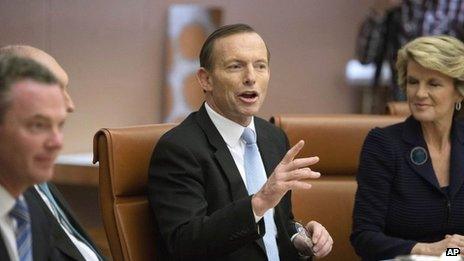New Australia PM Tony Abbott launches programme
- Published

Mr Abbott led the first meeting of his cabinet on Wednesday
New Australian Prime Minister Tony Abbott has brought his policy on asylum seekers into force and promised swift action on the rest of his programme.
All asylum-seekers arriving in Australia by boat are now to be towed back to Indonesia by the navy, where it is safe to do so.
The policy has been criticised by human rights groups.
Mr Abbott has also promised to move quickly to scrap a tax on carbon emissions introduced by Labor.
His conservative coalition won a comfortable lower house majority in the 7 September election, ending Labor's six-year term in office.
Tough message
The new policy of turning boats carrying asylum seekers back to Indonesia began after Mr Abbott's swearing-in ceremony in Canberra on Wednesday.
"It's so important that we send a message to the people-smugglers that from today their business model is coming to an end," Mr Abbott said at the ceremony.
Indonesia has voiced concern over the policy and rights groups have criticised both the previous and incoming governments' policies on asylum.
Australia's Prime Minister Tony Abbott in 90 seconds
Mr Abbott has also pledged to continue a Labor policy of sending all asylum-seekers arriving by boat to Papua New Guinea for processing and resettlement if found to be refugees.
Those deemed to be refugees will be limited to temporary protection visas which must be regularly renewed.
Also shortly after the swearing-in ceremony, Mr Abbott announced the sacking of three senior civil servants as part of a shake-up of the federal bureaucracy.
The position of science minister and a fund providing loans for green technologies are also expected to be scrapped. Two official bodies related to climate change are also expected to be closed, local reports say.
'Action' on carbon
The new prime minister also said on Wednesday that he was beginning work immediately to scrap the carbon tax introduced by Labor.
The tax made Australia's biggest polluters pay for carbon emissions over a certain amount. Mr Abbott said the measure had cost jobs and forced energy prices up.
Instead of the tax, he plans to introduce a "direct action" plan under which subsidies will be given to farmers and businesses to reduce their emissions.
Mr Abbott's policies on climate change have prompted criticism from Australia's chief scientist, Professor Ian Chubb. "These sorts of issues are not going away just because we ignore them," he told the Australian Broadcasting Corporation.
The 19 ministers in Mr Abbott's new cabinet were also sworn in on Wednesday. The cabinet line-up has caused debate because it contains only one woman, new Foreign Minister Julie Bishop.
With some votes still to be counted from the 7 September election, it appears that Mr Abbott's government will not control the Senate, meaning it may struggle to pass key legislation.
It is expected that the new administration will have to work with several minor parties to get bills passed in the upper house.
The Labor Party, meanwhile, is in the process of choosing a new leader, with both former deputy prime minister Anthony Albanese and powerbroker Bill Shorten vying to replace Kevin Rudd, who is stepping down.
- Published17 September 2013
- Published16 September 2013
- Published13 September 2013